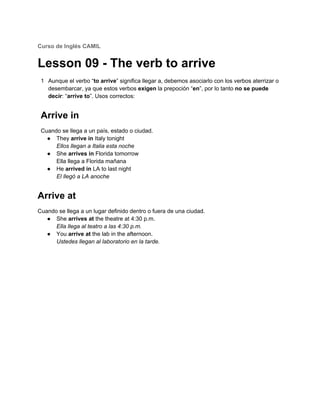Lesson 09 the verb to arrive
•
0 recomendaciones•858 vistas
Notas de clase del Curso de Inglés CAMIL
Denunciar
Compartir
Denunciar
Compartir
Descargar para leer sin conexión

Más contenido relacionado
Destacado
Destacado (20)
Lesson 04 the verbs to hope, to wait and to expect

Lesson 04 the verbs to hope, to wait and to expect
Ambiente Praxis - Escenarios en didáctica y virtualidad

Ambiente Praxis - Escenarios en didáctica y virtualidad
Más de Juanfer Mejía
Más de Juanfer Mejía (9)
mifutbol.net | El portal del futbolista aficionado

mifutbol.net | El portal del futbolista aficionado
Lesson 09 the verb to arrive
- 1. Curso de Inglés CAMIL Lesson 09 - The verb to arrive 1 Aunque el verbo “to arrive” significa llegar a, debemos asociarlo con los verbos aterrizar o desembarcar, ya que estos verbos exigen la prepoción “en”, por lo tanto no se puede decir: “arrive to”. Usos correctos: Arrive in Cuando se llega a un país, estado o ciudad. ● They arrive in Italy tonight Ellos llegan a Italia esta noche ● She arrives in Florida tomorrow Ella llega a Florida mañana ● He arrived in LA to last night El llegó a LA anoche Arrive at Cuando se llega a un lugar definido dentro o fuera de una ciudad. ● She arrives at the theatre at 4:30 p.m. Ella llega al teatro a las 4:30 p.m. ● You arrive at the lab in the afternoon. Ustedes llegan al laboratorio en la tarde.
